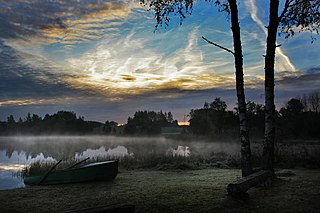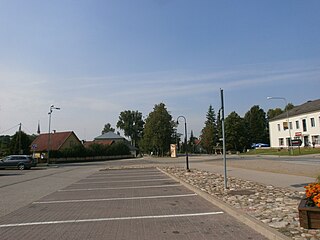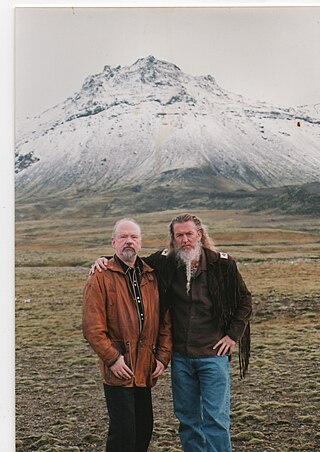
Estonian is a Finnic language of the Uralic family. Estonian is the official language of Estonia. It is written in the Latin script and is the first language of the majority of the country's population; it is also an official language of the European Union. Estonian is spoken natively by about 1.1 million people: 922,000 people in Estonia and 160,000 elsewhere.

Haiku is a type of short form poetry that originated in Japan, and can be traced back from the influence of traditional Chinese poetry. Traditional Japanese haiku consist of three phrases composed of 17 morae in a 5, 7, 5 pattern; that include a kireji, or "cutting word"; and a kigo, or seasonal reference. However, haiku by classical Japanese poets, such as Matsuo Bashō, also deviate from the 17-on pattern and sometimes do not contain a kireji. Similar poems that do not adhere to these rules are generally classified as senryū.
Philippine literature is literature associated with the Philippines from prehistory, through its colonial legacies, and on to the present.

Võru County is a county in southern Estonia. It is bordered by Valga and Põlva counties, Latvia's Alūksne and Ape municipalities, and Russia's Pskov Oblast.

Võro is the language of South Estonia, belonging to the Finnic branch of the Uralic language family. Governmentally, it has been considered a dialect of the Estonian language along with all varieties of South Estonian. However, many linguists consider South Estonian to be an independent Finnic language. It has its own literary standard and efforts have been undertaken to seek official recognition as an indigenous regional language of Estonia. Võro has roughly 75,000 speakers (Võros), mostly in southeastern Estonia, in the eight parishes of the historical Võru County: Karula, Harglõ, Urvastõ, Rõugõ, Kanepi, Põlva, Räpinä and Vahtsõliina. These parishes are currently centred in Võru and Põlva counties, with parts extending into Valga and Tartu counties. Speakers can also be found in the cities of Tallinn and Tartu and the rest of Estonia.
Eduard Petiška was a Czech writer, author of more than ninety titles. His books have been translated into dozens of languages and have become popular abroad. Total sales of his works have exceeded eighteen million copies.
Swedish literature is the literature written in the Swedish language or by writers from Sweden.
Taiwanese literature refers to the literature written by Taiwanese in any language ever used in Taiwan, including Japanese, Taiwanese Han and Austronesian languages.
Sudanese literature consists of both oral as well as written works of fiction and nonfiction that were created during the cultural history of today's Republic of the Sudan. This includes the territory of what was once Anglo-Egyptian Sudan, the independent country's history since 1956 as well as its changing geographical scope in the 21st century.
Alan Clayson is an English singer-songwriter, author and music journalist. He gained popularity in the late 1970s as leader of the band Clayson and the Argonauts. In addition to contributing to publications such as Record Collector, Mojo and Folk Roots, he subsequently established himself as a prolific writer of music biographies. Among his many books are Backbeat, which details the Beatles' early career in Germany, Ringo Starr: Straight Man or Joker?, and biographies of Jacques Brel, the Yardbirds, Serge Gainsbourg and Edgard Varèse. Clayson has also contributed to The Guardian, The Sunday Times, The Independent and Rock 'n' Reel.

Võro Institute is an Estonian state research and development institution dedicated to the preservation and promotion of the Võro language and culture.
Ibrahim Nasrallah, the winner of the Arabic Booker Prize (2018), was born in 1954 to Palestinian parents who were evicted from their land in Al-Burayj, Palestine in 1948. He spent his childhood and youth in a refugee camp in Jordan, and began his career as a teacher in Saudi Arabia. After returning to Amman, he worked in the media and cultural sectors till 2006 when he dedicated his life to writing. To date, he has published 15 poetry collections, 22 novels, and several other books. In 1985, he started writing the Palestinian Comedy covering 250 years of modern Palestinian history in a series of novels in which each novel is an independent one; to date 13 novels have been published in the framework of this project. Five of his novels and a volume of poetry have been published in English, nine in Persian, four works in Italian, two in Spanish, and one novel in Danish and Turkish.

Estonian literature is literature written in the Estonian language

Mark Abley is a Canadian poet, journalist, editor and nonfiction writer. His poetry and some of his nonfiction books express his interest in endangered languages. In November 2022 Abley was awarded an honorary D.Litt. by the University of Saskatchewan for his writing career and for his services to Canadian literature.

Fakhar Zaman was the chairman of the Pakistan Academy of Letters from 11 May 2008 to 12 March 2012, when Abdul Hameed replaced him as the next appointed chairman of the body. A leader of the Pakistan Peoples Party (PPP) and the chairman of the World Punjabi Congress, he has also been playing a notable role in politics to achieve his sociopolitical ideals.

Räpina is a town in Põlva County, Estonia. Räpina was administrative centre of Räpina raion from 1950 until 1961, currently it is the administrative centre of Räpina Parish. The oldest commercial enterprise in Räpina is a paper factory that opened in 1734.

Ron Whitehead is an American poet, author and activist. Whitehead was born on a farm in Kentucky, but traveled to the University of Louisville and Oxford University to pursue his academic interests.

Jason Vincent Brock is an American author, artist, editor and filmmaker.

Asko Künnap is an Estonian designer, writer, and artist.

Afghan literature or literature of Afghanistan refers to the literature produced in the Islamic Emirate of Afghanistan. Influenced by Central and South Asian literature, it is predominantly written in two native and official languages of Afghanistan, Dari and Pashto. Some regional languages such as Uzbek, Turkmen, Balochi, and Pashayi also appears in Afghan literature. While Afghanistan is a multilingual country, these languages are generally used as oral compositions and written texts by the Afghan writers and in Afghan curriculum. Its literature is highly influenced by Persian and Arabic literature in addition to Central and South Asia.













